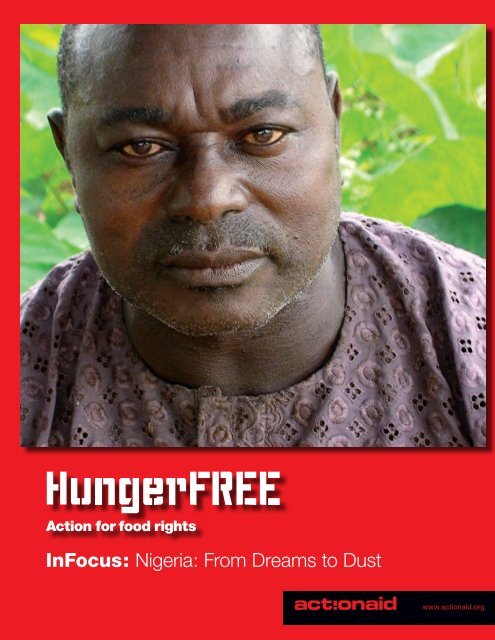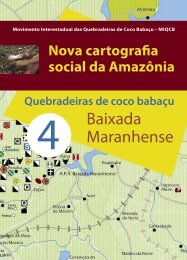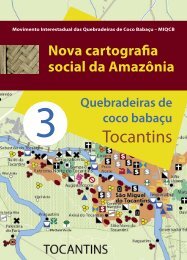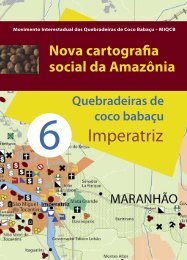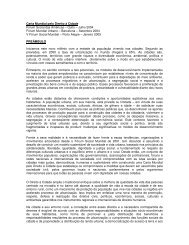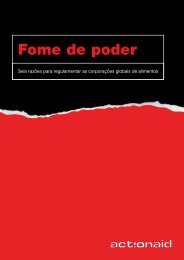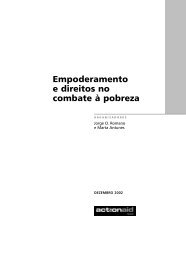Create successful ePaper yourself
Turn your PDF publications into a flip-book with our unique Google optimized e-Paper software.
<strong>InFocus</strong>: <strong>Nigeria</strong>: <strong>From</strong> <strong>Dreams</strong> <strong>to</strong> <strong>Dust</strong><br />
www.actionaid.org
Ginger Growers’<br />
<strong>Dreams</strong> Turn<br />
<strong>to</strong> <strong>Dust</strong><br />
<strong>Nigeria</strong> is the sixth largest exporter of<br />
crude oil in the world.<br />
When Kande Garba returned <strong>to</strong> her village in northern<br />
<strong>Nigeria</strong> nine years ago, she expected <strong>to</strong> earn more<br />
money growing ginger than her husband brought<br />
home as a technician in a textile company.<br />
After all, Katsit was known across the country for<br />
ginger and the crop was in demand.<br />
Similarly, John Umaru was not worried when he, <strong>to</strong>o,<br />
returned <strong>to</strong> the village after cutbacks by the Kaduna<br />
state government. He was sure ginger farming would<br />
bring in more income than he had received as a<br />
primary school teacher.<br />
“I was one of those who tried <strong>to</strong> visit the local<br />
government and the ginger company in 2004”, recalls<br />
the retired teacher. “We had an accident on the way.<br />
One of us died. They didn’t even pay us a condolence<br />
visit. Since then, nothing has happened.”<br />
He says farmers tried <strong>to</strong> fix a price themselves but<br />
the attempt collapsed: “People say they have <strong>to</strong> sell<br />
at the price they are offered or they will have nothing<br />
<strong>to</strong> eat.”<br />
Garba agrees: “Only a few people here have other<br />
ways of earning a living. Many of us can’t afford <strong>to</strong> dry<br />
the ginger and hold it until we get a better price. So<br />
people sell it <strong>to</strong> the middlemen at giveaway prices.”<br />
They also find it hard <strong>to</strong> get <strong>to</strong> the nearest market, a<br />
seven kilometre trek on a rough track. If they refuse<br />
<strong>to</strong> sell at the middlemen’s price, they have <strong>to</strong> walk the<br />
same distance back with their heavy load.<br />
According <strong>to</strong> 39-year-old Joseph Bongo, who has<br />
been growing ginger for 17 years, ginger farming is<br />
hard labour, without modern <strong>to</strong>ols, for little return.<br />
At first, their projections looked right. Prices quickly<br />
doubled, recalls Garba.<br />
Then they plummeted. In 1998, Umaru’s first bag of<br />
ginger sold for 4,000 Naira [about US$31]. Now, he<br />
says, a bag fetches 1,500 - 1,800 Naira.<br />
They blame the middlemen who buy the crop.<br />
“They say there’s no money, so they buy it at their<br />
price”, says Garba.<br />
Individual farmers don’t deal directly with the gingerprocessing<br />
plant about two<br />
hours drive from the village<br />
because they don’t produce<br />
enough for fac<strong>to</strong>ry use and<br />
they lack information and<br />
confidence.<br />
A Ginger Farmers Association<br />
was formed three years ago,<br />
but an attempt <strong>to</strong> deal with<br />
both the local government<br />
and the ginger fac<strong>to</strong>ry ended<br />
in disaster.<br />
“Many of us can’t<br />
afford <strong>to</strong> dry the<br />
ginger and hold it<br />
until we get a better<br />
price. So people sell it<br />
<strong>to</strong> the middlemen<br />
at giveaway prices.”<br />
“I plant five hectares a year,” he says. “In all, I spend<br />
about 120,000 Naira on labour and fertiliser. All I<br />
make is 70,000 Naira.”<br />
Umaru says he invests between 50,000 and 70,000<br />
Naira a year on his farm and earns 70,000-80,000<br />
Naira. That is without paying labourers: “My children<br />
and the people living with us work on the farm with<br />
me, so I’m able <strong>to</strong> reduce losses.”<br />
His hands show the <strong>to</strong>ll taken by the work. The years<br />
of cutting and peeling ginger have turned them the<br />
colour of chalk.<br />
Most Katsit farmers are struggling:<br />
few believe help will come from<br />
their elected representatives.<br />
“We have an elected councillor.<br />
Since he was chosen he has not<br />
helped us. In fact, he no longer<br />
has any interest in this place,” says<br />
Umaru, with a hint of contempt in<br />
his voice.<br />
Garba grins ruefully at the idea of<br />
approaching their representatives.<br />
She looks around, shrugs and<br />
1
“People say they have<br />
<strong>to</strong> sell at the price<br />
they are offered<br />
or they will have<br />
nothing <strong>to</strong> eat.”<br />
says resignedly, “Well, I don’t know if they can do<br />
anything.”<br />
Poverty and Hunger in <strong>Nigeria</strong><br />
<strong>Nigeria</strong>’s poverty level was 54 per cent in 2004,<br />
according <strong>to</strong> the National Bureau of Statistics. For<br />
people in the agriculture sec<strong>to</strong>r, it was 67 per cent.<br />
About 25 per cent of <strong>Nigeria</strong>n under-5s are under<br />
weight.<br />
Specific demands linked <strong>to</strong> the case<br />
study:<br />
• The Zongwa local government and Kaduna<br />
state governments should assist with<br />
modern farming equipment<br />
• The Kaduna State government should<br />
set up a farm produce board <strong>to</strong> serve as<br />
intermediary between the ginger farmers<br />
and the end-users<br />
• The state government should prioritise road<br />
repairs <strong>to</strong> improve market access.<br />
• The state government should ensure<br />
provision of social infrastructure in the village<br />
and treat it as a rights issue.<br />
General HungerFREE campaign<br />
demand in <strong>Nigeria</strong>: The federal<br />
government of <strong>Nigeria</strong> should:<br />
• Allocate more resources <strong>to</strong> research<br />
institutions <strong>to</strong> increase the yields and<br />
nutritional qualities of local food crops<br />
• Legislate <strong>to</strong> remove all constraints on<br />
women owning farmland<br />
• Reduce constraints on social services<br />
expenditure imposed by international<br />
financial institutions, including all economic<br />
partnership agreements (EPAs) undermining<br />
the capacity of <strong>Nigeria</strong>n farmers <strong>to</strong> earn a<br />
fair price<br />
• Strengthen anti-corruption legislation<br />
• Reduce expenditure on arms <strong>to</strong> allow<br />
increased spending on social services,<br />
including delivery of free universal basic<br />
education<br />
• Put up legal barriers <strong>to</strong> s<strong>to</strong>p government<br />
agencies destroying of the homes of the<br />
poor<br />
• Allocate more resources <strong>to</strong> local<br />
governments <strong>to</strong> scale up the implementation<br />
of the school health and nutrition<br />
programme, <strong>to</strong> ensure that every child has<br />
access <strong>to</strong> free and compulsory universal<br />
basic education<br />
• Make a commitment <strong>to</strong> a HungerFREE<br />
<strong>Nigeria</strong>.<br />
For more information and high-resolution copies<br />
of pho<strong>to</strong>graphs, please contact Alexandre Polack:<br />
alexandre.polack@actionaid.org<br />
Cover Pho<strong>to</strong>: Portrait of John Umaru, <strong>Nigeria</strong>n ginger farmer. Credit:<br />
Tunde Aremu<br />
2


